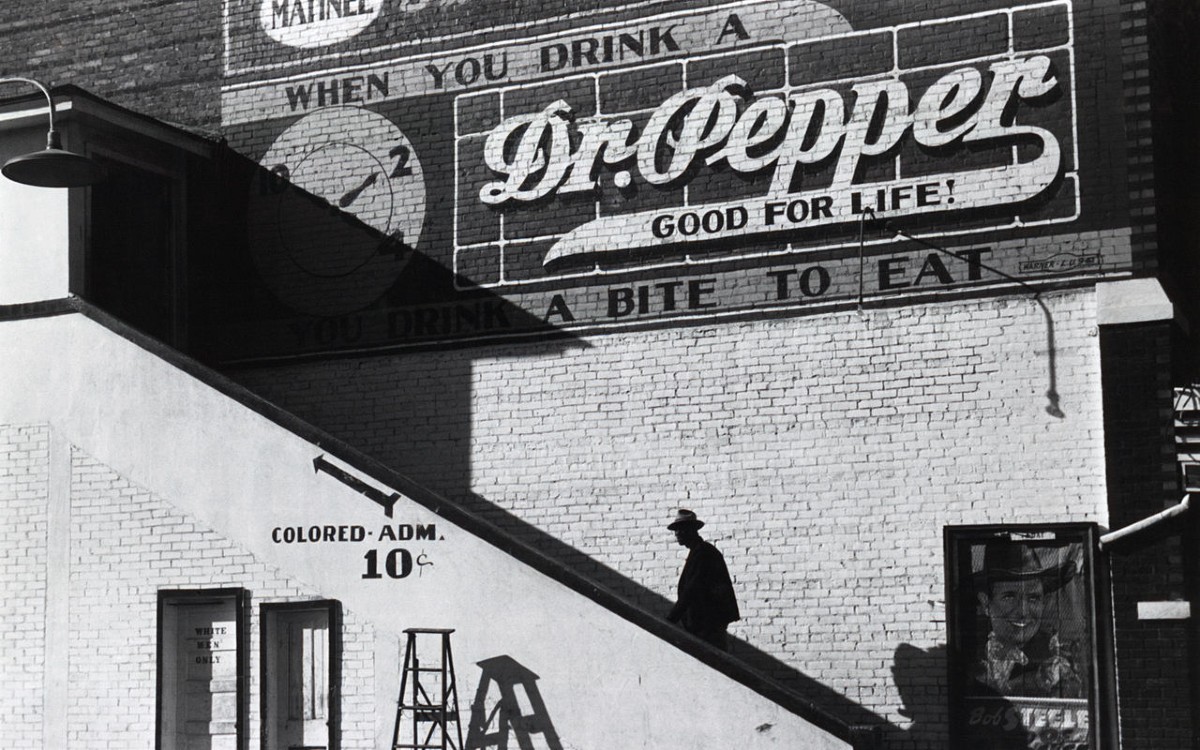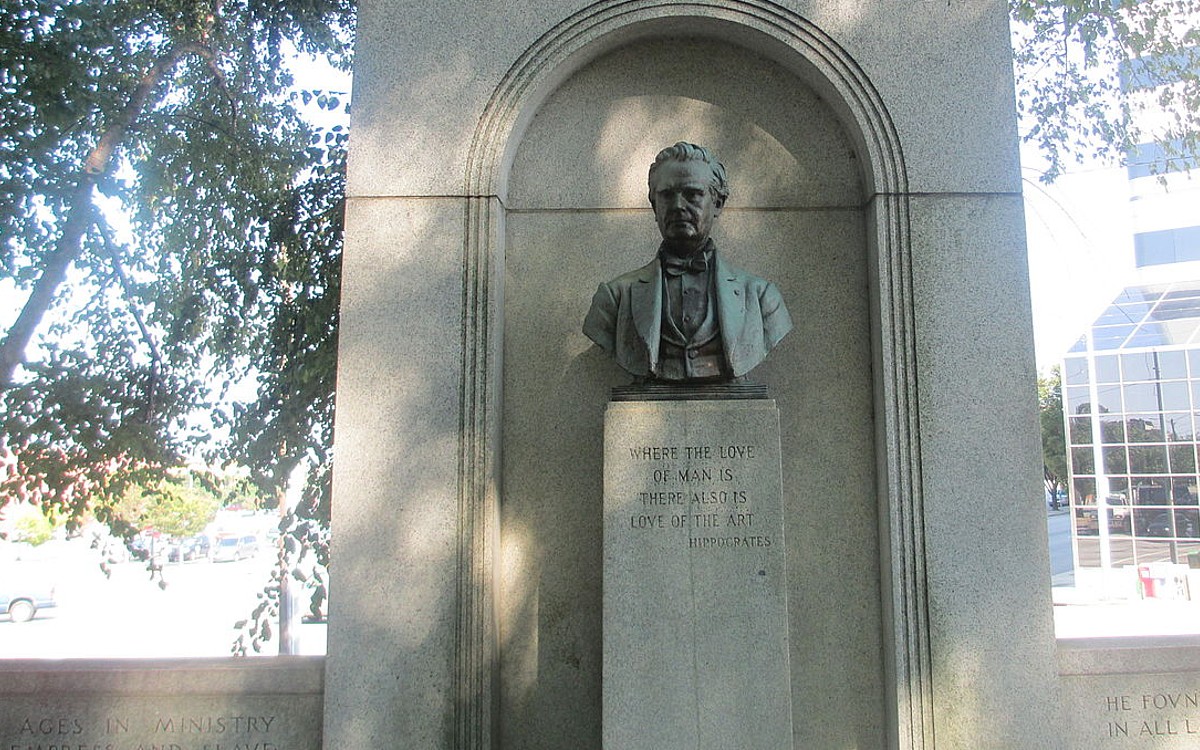INSIDE ISSUE 19.11 | March 13, 2020
 BIG STORY: Budget proviso limits S.C. response to virus, advocates say
BIG STORY: Budget proviso limits S.C. response to virus, advocates say
NEWS BRIEFS: DSS says money needed to protect children, more
COMMENTARY, Brack: Renew commitment to protecting civil rights of all Americans
SPOTLIGHT: S.C. Hospital Association
TRIBUTE: Remembering Tom Turnipseed
FEEDBACK: Send us your thoughts
MYSTERY PHOTO: A bust of whom?
Budget proviso limits S.C. response to virus, advocates say

By Lindsay Street, Statehouse correspondent | Just when low-income workers might need a way to get food during the emerging coronavirus pandemic, the state agency charged with being their advocate might have its hands tied by state leaders.
A state budget proviso bars the S.C. Department of Social Service from seeking a federal waiver on 2015 workforce requirements for food stamps.
Low-income worker advocates say this lack of flexibility could cause people to go hungry in South Carolina if the pandemic continues to thrash the economy and workers lose hours. But a state senator countered that no one would go hungry so long as they prove they are looking for a job.
The S.C. House of Representatives this week passed its version of the state budget, which includes a renewal of the proviso. Federal policy requires able-bodied adults without dependents to work 20 hours per week to receive assistance under the Supplemental Nutrition Assistance Program (SNAP).
The state budget — and its accompanying provisos — now heads to the S.C. Senate, where senators will begin drafting their version in the coming weeks.
DSS staff released a statement to Statehouse Report this week saying that, “If South Carolina were to experience a widespread, long-term impact due to coronavirus, then we would expect an increase in the SNAP caseload.”
Meanwhile, it is unclear whether the governor could or would consider removing the proviso as part of his response to the spreading coronavirus because his office did not respond to a request to comment.
‘No fault of their own’
Low-income worker advocacy nonprofit S.C. Appleseed Legal Justice Center has sounded the alarm since the proviso was first proposed in the Senate in 2018. Director Sue Berkowitz said the coronavirus shows “why you should never do” workforce requirements for benefits or provisos limiting state response.

“We have to look at (the pandemic as) what kind of benefits and resources will be available to help people get through this,” she said, adding that contract employees, food and beverage workers, and other low-income or tip-based workers may fall below the threshold for benefits “through no fault of their own.”
The novel coronavirus, COVID-19, is now an official pandemic, according to the World Health Organization. As of Friday morning, South Carolina had 12 reported cases. World-wide, there have been 4,600 deaths linked to 125,000 cases. In the United States, there have been 41 deaths linked to more than 1,600 cases. South Carolina has not seen any reported coronavirus-related deaths so far.
Gov. Henry McMaster has requested $45 million from state surplus funds to go toward S.C. Department of Health and Environmental Control to help combat the virus. House Speaker Jay Lucas, R-Hartsville, and House Ways and Means Chairman Murrell Smith, R-Sumter, said Thursday they would support the governor’s call.
Concurrently, McMaster, Senate President Harvey Peeler, R-Gaffney, and other state leaders have said public meetings, schools, and businesses should continue business as usual.
A media liaison with the South Carolina Restaurant and Lodging Association said the group spoke with state officials and it feels the tourism industry will remain strong.
“We believe the virus’ impact will be minimized,” Lenza Jolley wrote in a statement to Statehouse Report, when asked how the organization expects the virus to impact low-wage or tip-based workers. She prefaced the statement with 81 percent of South Carolina’s tourism coming from car-driven transportation, rather than airlines.
Already public events across the state are being canceled or postponed, including a SCforEd teacher rally planned for March 24. S.C. Department of Parks, Recreation & Tourism communications director Dawn Dawson-House told The Greenville News that hotel occupancy rates have declined 5.4 percent in the first week in March.
“It’s really concerning (for people) living paycheck to paycheck,” Berkowitz said.
After the state’s 2015 floods, DSS implemented a “Disaster SNAP” program in 24 counties, and provided one-time grants to more than 179,000 impacted individuals to help them replace lost food and cover unreimbursed disaster expenses or temporary loss of income. An agency media liaison said in a statement to Statehouse Report that usually natural disasters only cause “short-term” impact on people, and thus, there is usually no “spike in requests” for SNAP.
DSS plans to preserve continuity of operations during a state of emergency or quarantine situation, and address an increase in caseloads, according to the statement.
‘It’s not a cruel proviso’
The proviso is already in effect through the 2019-2020 fiscal year, which ends June 30. Berkowitz said reversing the proviso would likely take an emergency declaration from the governor, but the governor’s office did not respond to comment requests this week.
The budget proviso limiting a workforce waiver states: “The Department of Social Services shall not seek, apply for, accept, or renew any waiver of the requirements established pursuant to 7 U.S.C. Section 2015(o), relating to the mandatory work requirements of the Supplemental Nutrition Assistance Program.”

Hopkins Democratic Rep. Wendy Brawley said she opposes the proviso, though no effort was made during the House budget deliberations to remove it. Now that it has passed through to the Senate, she said she would like to see it reversed.
“I’m hopeful that the leadership will recognize that housing and food is just as essential as the testing that needs to be done for coronavirus,” she said. “That proviso was unwise.”
Democratic Sen. Darrell Jackson, also of Hopkins, said he also opposes the proviso.
“I have every intention to look at it and bring it to the attention of my colleagues in Finance,” he said. Jackson serves on the Senate Finance Committee. “This whole SNAP proviso is something I’ve dealt with before and I will try to do again … I’m hoping the environment has changed because of this virus.”
Lexington Republican Sen. Katrina Shealy was one of a handful of Republicans who proposed adding the proviso to the 2018-2019 budget. She said she stands by her support.
“It’s not a cruel proviso; it just says you have to apply for a job somewhere,” Shealy said. “Whatever the federal law is, you have to be following that. It’s not anything unreasonable … People are reading more into this proviso than is out there.”
- Have a comment? Send to: feedback@statehousereport.com
DSS says money needed to protect children

By Lindsay Street, Statehouse correspondent | The S.C. Department of Social Services has requested an additional $69 million it says it needs to provide measurable improvements and outcomes for children.
The agency is working to comply with a 2016 U.S. District Court settlement of a case known as the Michelle H. Class Action lawsuit. The lawsuit claimed the agency’s foster care system had excessive caseloads for DSS workers and failed to provide basic health care and precautions to keep children safe.
 Gov. Henry McMaster’s proposed executive budget included the $69 million request, but the House-passed budget included $40 million in recurring money. The House approved an additional $14.2 million in non-recurring money toward the agency that will also address priorities related to the lawsuit, according to DSS. The state’s $10 billion spending plan now heads to the Senate.
Gov. Henry McMaster’s proposed executive budget included the $69 million request, but the House-passed budget included $40 million in recurring money. The House approved an additional $14.2 million in non-recurring money toward the agency that will also address priorities related to the lawsuit, according to DSS. The state’s $10 billion spending plan now heads to the Senate.
According to a statement from DSS, “The timeframe for these improvements being fully realized is largely dependent on whether the Department’s request is fully funded as requested by DSS and included in the Governor’s Executive Budget, or funded at the amount currently included in the House budget.”

Walhalla Republican Sen. Thomas Alexander chairs the Finance Committee’s panel reviewing DSS’s request.
“It’s too early to tell (whether it will be fully-funded in the Senate). As with all requests from all agencies, we have to work through all those requests and certainly we will be doing that,” he said. “They’ve had a change in leadership and I think he’s doing a good job with the agency and making some decisions and trying to lead the agency in a new direction with the right sense of principles and priorities, and that will go a long way with us toward addressing their priorities to the extent that we can.”
DSS Director Michael Leach, who was not available for an interview for this story, has been on the job for little less than a year, but he has earned praise from lawmakers and advocates alike.
Lexington Republican Sen. Katrina Shealy, who has led much of the effort to reform the agency in recent years, said she has faith in Leach’s ability to enact meaningful changes that protect children.
Shealy said the Senate “will do better” than the House’s proposed DSS funding, but said it may not meet 100 percent of the request.
In other news:
![]() House takes a break. The S.C. House of Representatives will be on break for the next week in what has become a time-honored tradition. Members typically take a break following passage of the budget, and sometimes again around Easter. Around the turn of the century (no one knows exactly when), then-House Speaker David Wilkins of Greenville made it “common practice.” Wilkins said that it wasn’t to show off that the House was working faster than its upper chamber colleagues, but “more of a we’ve done our work and now we can have three days off from session and come back renewed in the remaining weeks.” He said it also saves the state money because lawmakers don’t get a per-diem coming into Columbia that week. The House returns to session March 24. (Side note: the Senate also sometimes takes a break.)
House takes a break. The S.C. House of Representatives will be on break for the next week in what has become a time-honored tradition. Members typically take a break following passage of the budget, and sometimes again around Easter. Around the turn of the century (no one knows exactly when), then-House Speaker David Wilkins of Greenville made it “common practice.” Wilkins said that it wasn’t to show off that the House was working faster than its upper chamber colleagues, but “more of a we’ve done our work and now we can have three days off from session and come back renewed in the remaining weeks.” He said it also saves the state money because lawmakers don’t get a per-diem coming into Columbia that week. The House returns to session March 24. (Side note: the Senate also sometimes takes a break.)
No coronavirus plans yet. House Speaker Jay Lucas, R-Hartsville, reportedly is monitoring the coronavirus, but his office said there is no official comment on whether he is considering curbing some public meetings at the Statehouse in response to the virus. Meanwhile, Senate President Harvey Peeler, R-Gaffney, said Thursday during session the Senate will go on.
Santee Cooper works on settlement. During a Thursday meeting, state-owned utility Santee Cooper approved a $520 million settlement for a lawsuit stemming from its failed nuclear construction project. The pending settlement ends a standoff with ratepayers and could eliminate the utility’s major financial threat. Former S.C. Supreme Court Chief Justice Jean Toal will need to approve the settlement before it is finalized. Read more.
- Related: The Senate’s reform plan for Santee Cooper is now in the Judiciary Committee, but as of March 13, no meeting has been scheduled on the plan.
1988 law found unconstitutional. A federal judge struck down a South Carolina law Wednesday that prohibited the discussion of same-sex relationships in public school sexual education classes after a group of LGBTQ advocates filed suit against the state, saying the law unconstitutionally affected non-heterosexual students. Read more.
Tracking rape kits passes the Senate. After passing the Senate, a rape-kit tracking bill will soon head toward Gov. Henry McMaster’s desk. The House and Senate will need to agree on differences between their versions of the bill. Editor and Publisher Andy Brack penned a column earlier this year urging passage of the bill. Read it here. It is unknown what the fiscal impact of the bill will be, according to a Revenue and Fiscal Affairs Office report.
Women in Senate rally behind ERA. An all-woman (and every-woman — there are only four women in the S.C. Senate) Senate subcommittee voted this week to move state ratification of the Equal Rights Amendment to full committee. Shealy said she thinks it will make it to a floor vote before session closes in May, predicting that it may become a tough vote for on both sides in an election year.
Meeting March 25 on child well-being in S.C. The S.C. Child Well-Being Coalition meets 9 a.m.-12:20 p.m. March 25 at Brookland Banquet and Conference Center in West Columbia. The free and open event will feature updates and speakers. More info.
‘Heartbeat’ still looms in Senate. A bill that seeks to end nearly all abortions in the state is still lingering on the Senate calendar. “It’s always kind of lurking over us,” Hopkins Democratic Sen. Darrell Jackson told Statehouse Report. Republican sources tell us that the abortion debate will likely come after the budget and Santee Cooper (and the March 30 election filing period deadline).
Filing period opens March 16. And speaking of election filing period: The 2020 candidate filing period opens noon, March 16, and closes noon, March 30. All Senate seats and all House seats are up for election this year. Learn about candidate qualifications here.
- Have a comment? Send to: feedback@statehousereport.com
Renew commitment to protecting civil rights of all Americans

By Andy Brack, editor and publisher | The forced segregation that stained the American South isn’t as far in the past as you may think.
 A century ago when your great grandparents were toddlers or were raising their own, lynchings were commonplace. It wasn’t until after World War II that an American president, Harry Truman, ended segregation in the armed forces. The U.S. Supreme Court ruled separate was not equal in public schools in 1954, although in reality it took one or two more decades for many schools to integrate, including the segregated elementary school I attended in south Georgia.
A century ago when your great grandparents were toddlers or were raising their own, lynchings were commonplace. It wasn’t until after World War II that an American president, Harry Truman, ended segregation in the armed forces. The U.S. Supreme Court ruled separate was not equal in public schools in 1954, although in reality it took one or two more decades for many schools to integrate, including the segregated elementary school I attended in south Georgia.
The push to end the stain of segregation got a big start in South Carolina, U.S. District Judge Richard Gergel writes in his fascinating 2019 book, “Unexampled Courage: The Blinding of Sgt. Isaac Woodard and the Awakening of President Harry S. Truman and Judge J. Waties Waring.”
Gergel traces the case of a black Army sergeant traveling home in uniform from World War II. He was beaten, blinded and arrested in Batesburg, S.C., after a bus driver reported the veteran for talking back when refused a bathroom stop.
 Isaac Woodard’s case ended up getting national attention, including notice by Truman, who was outraged that a man who fought for freedom would be crippled because of the Jim Crow South. Despite the approaching election year, Truman established the first presidential commission on civil rights.
Isaac Woodard’s case ended up getting national attention, including notice by Truman, who was outraged that a man who fought for freedom would be crippled because of the Jim Crow South. Despite the approaching election year, Truman established the first presidential commission on civil rights.
By 1948, the commission published a 178-page report that outlined the importance of protecting and preserving the civil rights guaranteed to all Americans. About the same time, a brave federal judge in Charleston, also vexed by the Woodard case and simmering injustice, started to issue rulings that stabbed at the core of segregation in politics and schools. The dissent of the late U.S. District Judge J. Waties Waring in a Clarendon County school desegregation case had a strong impact and, many say, was the blueprint for the U.S. Supreme Court’s landmark Brown v. Board ruling that separate schools were not equal.
Two South Carolina incidents — the tragic blinding of a veteran and a ruling that sent a case to the Supreme Court — are at the root of the end of legal segregation in the country.
Truman’s landmark report called for freedom from fear for all Americans. “The preservation of civil liberties is a duty of every Government — state, Federal and local,” the report said. “Wherever the law enforcement measures and the authority of Federal, state, and local governments are inadequate to discharge this primary function of government, these measures and this authority should be strengthened and improved.”

The report then outlined four essential rights of all Americans — the right to safety and security, the right to citizenship and its privileges, the right to freedom of conscience and expression, and the right to equality and opportunity. Authors shared myriad suggestions for improving civil rights, such as desegregating the armed forces, strengthening the civil rights power of the U.S. Justice Department, reducing injustice, curbing police brutality, enhancing voting rights and updating citizenship laws.
Many of the recommendations in the report were implemented, but its soul — of dealing with immigration, citizenship, voting rights, injustice, due process, equal opportunity and equal protection under the law — still haunts America. Just look at headlines on any day of the week.
America needs to renew its commitment to the ideals in Truman’s Committee on Civil Rights.
“I have one priority that applies to all civil rights,” U.S. Rep. Jim Clyburn, D-S.C., told Statehouse Report this week. “It is the message on my billboards that reads: ‘Making America’s greatness accessible and affordable for all.’
“This priority applies to education: make it accessible and affordable; health care: make it accessible and affordable; housing: make it accessible and affordable. Any civil rights issue should be addressed in terms of accessibility and affordability.”
Failing to finish the work of civil rights protections for all Americans violates the country’s basic principles, said State Rep. Gilda Cobb Hunter, D-Orangeburg. But she warned a renewed commitment to civil rights “isn’t going to fare any better than the old one without a commitment to change things.”
Let’s have the courage of Woodard, Truman and Waring and make change for a more perfect union.
- Have a comment? Send to: feedback@statehousereport.com.
Municipal Association of South Carolina
 The public spiritedness of our underwriters allows us to bring Statehouse Report to you at no cost. This week’s spotlighted underwriter is the Municipal Association of South Carolina. Formed in 1939, the association represents and serves the state’s 271 incorporated municipalities.
The public spiritedness of our underwriters allows us to bring Statehouse Report to you at no cost. This week’s spotlighted underwriter is the Municipal Association of South Carolina. Formed in 1939, the association represents and serves the state’s 271 incorporated municipalities.
The Association is dedicated to the principle of its founding members: to offer the services, programs and products that will give municipal officials the knowledge, experience and tools for enabling the most efficient and effective operation of their municipalities in the complex world of municipal government.
- Learn more: MASC.
Remembering Tom Turnipseed

EDITOR’S NOTE: Former State Sen. and firebrand Tom Turnipseed of Columnia passed away last week at age 83. As a tribute, we offer an excerpted profile from 1994 by Becci Robbins that was published in The Point. We appreciate her permission to share with you.
By Becci Robbins, republished with permission | Tom Turnipseed is nothing if not intense. “It’s a family trait,” he explains, ticking off a list of relatives remembered for being high-strung.”My people wear their emotions up front. …”
He first began making headlines in the mid-’60s, when he was a director of the Independent Schools Association, then a loose-knit group of academics whose primary purpose was remaining all-white. Turnipseed built the ISA into a full-fledged power in South Carolina, adding over 20 segregated institutions by the time he left in 1967 ro join the staff of Alabama Gov. George Wallace.
Had he lived to see it, Big Daddy [the nickname for Turnipseed’s father] would have been proud of the young Turnipseed, who at age 32 was running Wallace’s national presidential campaign. Turnispeed believed in the governor’s agenda, admired his spunk, thought the man had no choice but to stand in that school house door. Someone had to challenge the outsiders who for over 100 years had been telling Southern folk how to run their business. …
That same year, Turnipseed moved to Columbia to open a law practice and begin mapping his own political career. By 1973, he had launched his first campaign for statewide office in a bid for attorney general. One of the first public issues he chose to take on was the regulation of utility rates. When SCE&G took advantage of a state law which allowed utilities to implement rate increases without even a hearing before the Public Service Commission, Turnipseed filed suit to have the law declared unconstitutional.
“We were taking on the power structure, and the allies we needed to help us build a coalition were the working class poor,” Turnipseed remembers. This is how he found himself, for the first time in his life, talking with black people, going into their neighborhoods, addressing meetings of the NAACP. …
After three decades of raising eyebrows, hackles and holy hell across South Carolina, most people around here have heard of him. They’ve seen his television ads. They’ve read about him in the newspaper.
Over the years, the press has used words like “mercurial,” “flamboyant,” “fiery,” and “explosive” to describe the 58-year old former senator. They have called him “a rabble rouser,” “a thorn in the side of the South Carolina establishment” and “an affront to the more traditional-minded Statehouse inhabitants.”
Somebody called him “a latter-day Huey Long, crazy as a damned bedbug, but crazy in a smart way.” Another writer described his stint in the Senate — from 1976 to 1980 — as “four years of eye-rolling, obstreperous and bellicose ranting and raving. …”
After four years, Turnipseed gave up his Senate seat to run against U.S. Rep. Floyd Spence, who narrowly won reelection in spite of outspending the senator five to one. (Turnipseed had refused to accept corporate campaign contributions.)
By then, Turnipseed leaned decidedly left. In a 1980 article that ran in the alternative publication Harbinger, he read like a non-rhyming Reverend [Jesse] Jackson.
“Think of the tremendous power that people have if they just get together,” he said. A photo shows him gesturing from behind a lectern hung with a painting of [the Rev.] Martin Luther King Jr. “We can’t let money rule us,” he said, “just absolutely rule every phase and aspect of our lives.”
Asked whether he would go so far to describe himself as a revolutionary, he said, “I’m as revolutionary as Mark Twain, Dickens and Jesus. No one has ever put down money and greed like Jesus. He spent his whole life trying to help oppressed people.”
Turnipseed switched political allegiances long before it became fashionable. The years he has spent redefining his ideology have lent him a strange political alchemy that gives him an edge. Because he used to be one of them, he can relate to conservatives, bigots and racists in ways other liberals cannot.
“When I hear Rush Limbaugh,” he says, “I’ve heard it all before. I used to say it …”
“Tom is always involved, engaged, active, changing,” [his wife] Judy explains. “He is never satisfied with things the way they are. Sometimes it wears me out.”
“Tom is a tireless worker for the people,” says [the late] Merll Truesdale, a Columbia activist who has known Turnispeed for 26 years. “He is a rabble rouser, yes, but he fights for the right things. I wish there were 10 more Toms and things might actually get done.”
Rep. Gilda Cobb-Hunter (D-Orangeburg), who served with Turnispeed on the board of S.C. Fair Share, a consumer, environmental and workers’ rights organization, says he has long been committed to fairness and decency. “He is a real intense, passionate person who has a burning desire to see justice and equality for all people, regardless of their station in life,” she says. “He fills a vital role. I liken him to a washing machine; unless it agitates, nothing gets clean.”
She says his appeal is that he can relate to anybody: rich or poor, young or old, redneck or radical. “I think he has been misunderstood as this person out in left field. I don’t see him that way. I see him as a person real committed to the things he believes in.”
Columbia writer Becci Robbins is communications director for the S.C. Progressive Network.
Make our day: Send us a letter or comment
We love hearing from our readers and encourage you to share your opinions. But you’ve got to provide us with contact information so we can verify your letters. Letters to the editor are published weekly. We reserve the right to edit for length and clarity. Comments are limited to 250 words or less. Please include your name and contact information.
- Send your letters or comments to: feedback@statehousereport.com
A bust of whom?

Here’s a South Carolina-related bust. Look familiar? Who and where is it? Send your best guess to feedback@statehousereport.com. And don’t forget to include your name and the town in which you live.
Our previous Mystery Photo
 Our March 6 image, “Light and reflections,” was a snapshot offered by Alaska reader Thomas Jacobsen of the Muses pool during the Night of a Thousand Candles at Brookgreen Gardens.
Our March 6 image, “Light and reflections,” was a snapshot offered by Alaska reader Thomas Jacobsen of the Muses pool during the Night of a Thousand Candles at Brookgreen Gardens.
Congratulations to alert sleuths who recognized the scene or figured it out using Internet tools: Barry Wingard and Melinda J. Lott, both of Florence; David Lupo of Mount Pleasant; Gwen Strickland of Marion; Ronna Toombs of Summerville; Susan James, Daniel Brennan and Jay Altman, all of Columbia; Debbie Causey of North Myrtle Beach; George Graf of Palmyra, Va.; George Ulrich of Horry County; Philip Cromer of Beaufort; Allan Peel of San Antonio, Texas; and Daniel Prohaska of Moncks Corner.
Peel provided lots of context: “Today’s mystery photo was taken during one of the annual ‘Nights of a Thousand Candles’ holiday season lighting events in Brookgreen Gardens, near Myrtle Beach, SC. The holiday lights are framing the ‘Fountain of Muses’ bronze sculpture group and fountain, originally created by Swedish sculptor Carl Milles.
“Each year, the ‘Nights of a Thousand Candles’ event transforms Brookgreen Gardens into a magical, wintry paradise. Each weekend at dusk in December, visitors can stroll amid the soft glow of more than 5,500 hand-lit candles, countless sparkling lights, and mesmerizing, lighted displays of gardens and fountains.
“Voted one of the top 10 ‘Best Public Gardens’ in the U.S. by TripAdvisor, Brookgreen Gardens is home to beautiful gardens, historical sites, world-renowned art collections, and native animals in their own, on-site zoo. A little known fact is that Brookgreen Gardens has largest outdoor display of American sculptures in the world.
“The group of bronze sculptures and fountains depicted in the mystery photo was originally created from clay moldings by Carl Milles (1875-1955) between 1949 and 1954. The sculptures were completed in 1955 and installed in the cafeteria of the Metropolitan Museum of Art in New York City shortly after Milles death (click here for a 1955 photo of this installation at the Metropolitan Museum). It was then moved to its current home at Brookgreen Gardens in 1982.”
- Send us a mystery: If you have a photo that you believe will stump readers, send it along (but make sure to tell us what it is because it may stump us too!) Send to: feedback@statehousereport.com and mark it as a photo submission. Thanks.
ABOUT STATEHOUSE REPORT
Statehouse Report, founded in 2001 as a weekly legislative forecast that informs readers about what is going to happen in South Carolina politics and policy, is provided to you at no charge every Friday.
Meet our team
- Editor and publisher: Andy Brack, 843.670.3996
- Statehouse correspondent: Lindsay Street
Buy the book
Now you can get a copy of editor and publisher Andy Brack’s We Can Do Better, South Carolina! ($14.99) as a paperback or as a Kindle book ($7.99). . The book of essays offers incisive commentaries by editor and publisher Andy Brack on the American South, the common good, vexing problems for the Palmetto State and interesting South Carolina leaders.
More
-
- Mailing address: Send inquiries by mail to: 1316 Rutledge Ave., Charleston, SC 29403
- Subscriptions are free: Click to subscribe.
- We hope you’ll keep receiving the great news and information from Statehouse Report, but if you need to unsubscribe, go to the bottom of the weekly email issue and follow the instructions.
- © 2020, Statehouse Report, a publication of City Paper Publishing, LLC. All rights reserved.
- Read our sister publications: Charleston City Paper (every Wednesday) | Charleston Currents (every Monday















 We Can Do Better, South Carolina!
We Can Do Better, South Carolina!
At one time I thought Tom Turnipseed was a red neck from out of state. Now a part of me supports what he stood for and what he did.
RIP Tom.